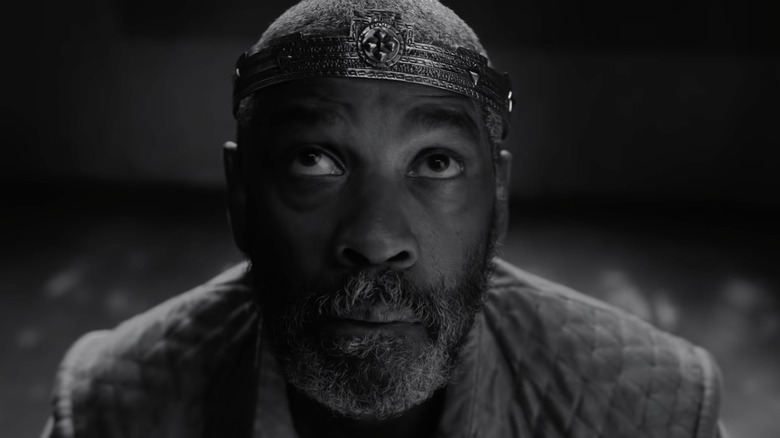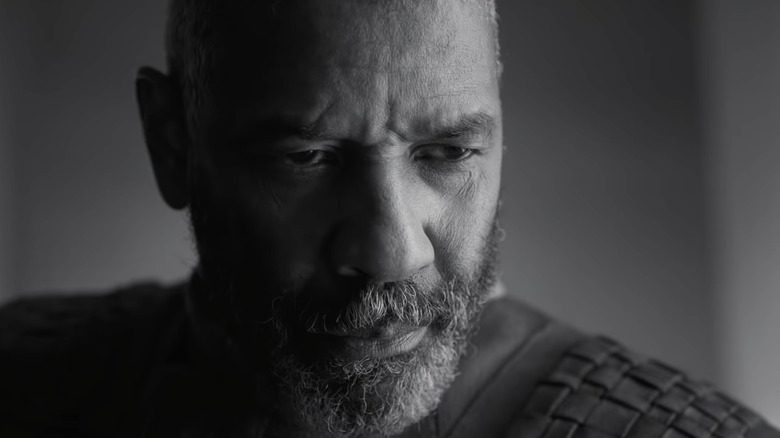Joel Coen Kept Denzel Washington On His Toes While Rehearsing The Tragedy Of Macbeth
If you have ever performed in a play, whether it was for school, community theatre, or even professionally, you are all too aware of the importance of an ensemble. The old adage of "no small parts" rings enormously true when in the thick of a production where the work of every single person around you is required to have the show reach its full potential. And if by chance someone falters for some reason, the rest of the company is there to help lift up that person because they know how crucial that person is to what the show is.
Film rarely gets to achieve this level of unity amongst its cast. Rarely, if ever, is everyone who is in the movie in the same space at the same time. Many movies eschew rehearsals for the cast to build a rapport with each other. If they do have rehearsals, they won't be particularly extensive and will probably happen on a scene-by-scene basis, as movies are not obviously shot in one fell swoop like a play. But this is William Shakespeare we are talking about, and to get Shakespeare right, you need rehearsal.
Denzel Washington is no stranger to performing Shakespeare on stage. One of his earliest gigs was an Off-Broadway production of "Coriolanus" in 1979 with Morgan Freeman in the title role. Since then he has taken up classic parts in "Richard III" and "Julius Caesar," not to mention his work in Kenneth Branagh's tremendous film adaptation of "Much Ado About Nothing" as Don Pedro. So he has had his fair share of working in a room with his fellow actors and directors on cracking these complicated texts. For "The Tragedy of Macbeth," however, director Joel Coen took a rather unusual approach when he got all of his actors together to work through the script, one that surprised Washington a great deal.
Trying on different hats
When you are an actor approaching a piece of material, it is easy to become very myopic in how you look at the story. After all, you are just playing one character and need to inhabit that person as best you can. How you view every scene is through the character's point of view. Most of the time, there is absolutely no problem with this approach. However, when working with delicate, complicated material like "Macbeth" under the tutelage of the precise vision of Joel Coen, every single person needs to be on the same page. Before the actors could go and dig into their own characters for themselves, they needed a more bird's eye view of the whole thing. This included a rehearsal tactic with everyone performing different parts than they would in the film. Washington explained at the New York Film Festival premiere:
"The way Joel and Fran [McDormand] led us, we sat round the table and people played different roles. People played different roles in the readings, and we became, I think, a company. My daughter [Olivia Washington] had maybe one line in the film, a wonderful actress, and the first day was a reading, Joel was like 'Well, no, you're going to read the King,' and he threw everybody under the bus. And you had to sink or swim. And you know, that's what we, I, we live for."
This is some tremendous acting exercise stuff. Keeping an actor on their toes and throwing them a curveball a like this keeps the spontaneity of performance alive. Putting everyone in that position requires that coming together and lifting one another up. If Denzel Washington can come in for a two-line part to support someone who we have never heard of before, that person can do the same for Denzel when shooting starts. You get a more complete picture of the play and a better understanding of the people you will be working with. Also, it would just be immensely enjoyable to see Frances McDormand play Banquo or Corey Hawkins play the Porter or whatever the actor/character combinations ended up being. When so many actors are often cast according to type, having them take on wildly different characters on the spot creates an energy that every person in the room wants to be apart of. Personally, I wish there was extensive footage of these rehearsals to see those performances.

